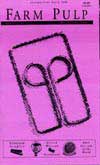Difference between revisions of "Farm Pulp"
m (→External Links) |
m (Reverted edits by Reverse101 (Talk) to last version by InvisibleFriend) |
||
| (7 intermediate revisions by 3 users not shown) | |||
| Line 1: | Line 1: | ||
| − | '''Farm Pulp''' has been sporadically published by [[Gregory Hischak]] since 1990. Hischak began publishing | + | [[Image:Farmpulp.jpg|frame|Issue #31]] |
| + | |||
| + | '''Farm Pulp''' has been sporadically published by [[Gregory Hischak]] since 1990. | ||
| + | |||
| + | Hischak began publishing '''Farm Pulp''' upon moving from Cincinnati, OH to Seattle, WA. The [[zine]] began with design taking precedence; Hischak borrowed most of his text and artwork from other, often old and out of print publications. As the zine progressed, it grew more complex in theme, structure and content, and featured Hischak's elaborate fiction and satire. | ||
In a 1992 interview with the ''The Stranger'', Hischak said of his early issues, "Originally, text was just a block; it was gray-scale art that I could fill areas with. I started getting bored with that format, so instead of stealing text, I started writing my own. It seemed quicker that way. I became a typographer first, and then a writer." | In a 1992 interview with the ''The Stranger'', Hischak said of his early issues, "Originally, text was just a block; it was gray-scale art that I could fill areas with. I started getting bored with that format, so instead of stealing text, I started writing my own. It seemed quicker that way. I became a typographer first, and then a writer." | ||
| − | Farm Pulp issues have used a number of themes and ideas over the years, from discussions about publishing and long arm staplers to those about the letters between Vincent Van Gogh and his brother Theo. | + | ''Farm Pulp'' issues have used a number of themes and ideas over the years, from discussions about publishing and long arm staplers to those about the letters between Vincent Van Gogh and his brother Theo. |
| + | |||
| + | Excerpts from the zine have been featured in [[The Factsheet Five Zine Reader]] and also in [[Zine Yearbook]]. ''Farm Pulp'' is included in the West Coast Zine Collection at San Diego State University. | ||
==External Links== | ==External Links== | ||
| − | [http://www.zinebook.com/excerpts/farmexc.html "Chums," a story from ''Farm Pulp''] | + | * [http://www.zinebook.com/excerpts/farmexc.html "Chums," a story from ''Farm Pulp''] |
| + | * [http://www.brokenpencil.com/reviews/reviews.php?reviewid=2821 Broken Pencil Review] | ||
| + | * [http://scua.sdsu.edu/collections/zinesfindingaid.shtml West Coast Zine Collection at San Diego State University] | ||
| − | [[Category:Zine]] [[Category:Zine Yearbook]] [[Category:Musea Zine Hall of Fame]] [[Category:Washington Zines]] | + | [[Category:Zine]] [[Category:Zine Yearbook]] [[Category:Musea Zine Hall of Fame]] [[Category:Washington Zines]] [[Category:Zines from the U.S.A.]] |
| + | [[Category:1990's publications]][[Category:2000's publications]] | ||
| + | [[Category:West Coast Zine Collection]] | ||
Latest revision as of 18:49, 30 November 2011
Farm Pulp has been sporadically published by Gregory Hischak since 1990.
Hischak began publishing Farm Pulp upon moving from Cincinnati, OH to Seattle, WA. The zine began with design taking precedence; Hischak borrowed most of his text and artwork from other, often old and out of print publications. As the zine progressed, it grew more complex in theme, structure and content, and featured Hischak's elaborate fiction and satire.
In a 1992 interview with the The Stranger, Hischak said of his early issues, "Originally, text was just a block; it was gray-scale art that I could fill areas with. I started getting bored with that format, so instead of stealing text, I started writing my own. It seemed quicker that way. I became a typographer first, and then a writer."
Farm Pulp issues have used a number of themes and ideas over the years, from discussions about publishing and long arm staplers to those about the letters between Vincent Van Gogh and his brother Theo.
Excerpts from the zine have been featured in The Factsheet Five Zine Reader and also in Zine Yearbook. Farm Pulp is included in the West Coast Zine Collection at San Diego State University.
